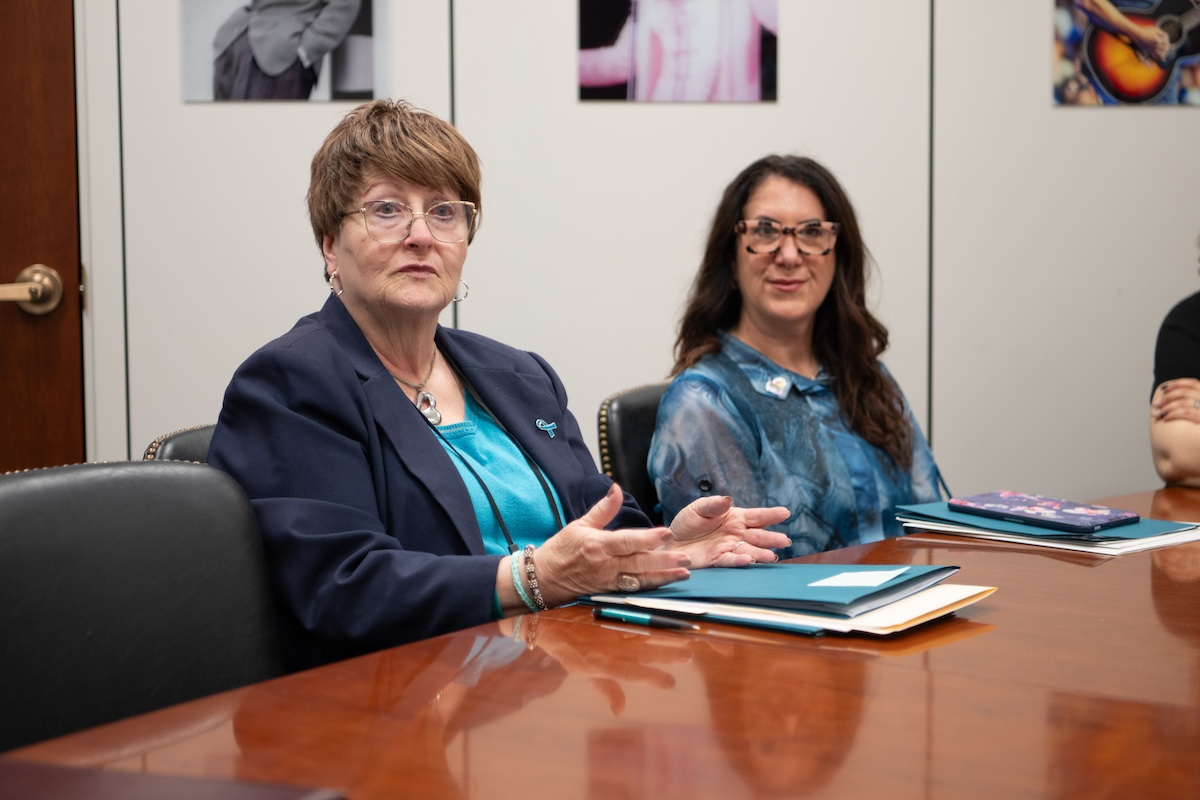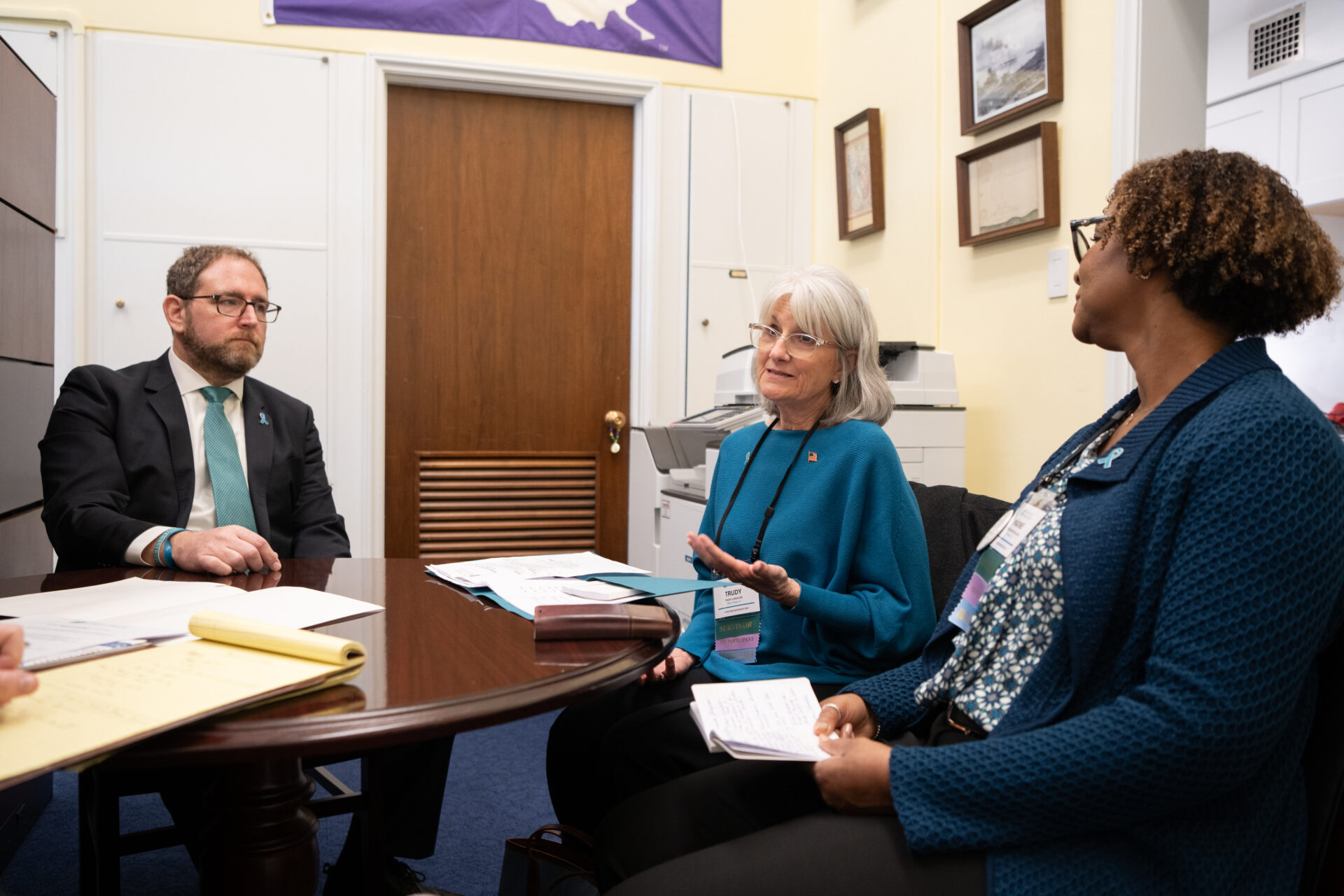US Representative Rosa DeLauro (D-CT) is the Chair and founder of the Congressional Ovarian Cancer Caucus. Established in 2015, the Caucus set out to raise awareness of ovarian cancer symptoms and support for research. This was almost a decade after Representative DeLauro helped lead a bipartisan coalition to pass the original Johanna’s Law – also known as the Gynecologic Cancer Education and Awareness Act – which she also helped to re-authorize, and which is up for re-authorization once again. It is both her own experience with ovarian cancer and her upbringing that have made the Congresswoman a true champion for the teal community.

The daughter of public servants
DeLauro’s parents were engaged in the Democratic Party in the city of New Haven, CT, where she grew up. They each served on the city council, and Representative DeLauro grew up in a household that was steeped in politics and public policy, at a local level.
“My folks did not write omnibus legislation,” she said. “They ministered to people’s needs, to the community. Our kitchen table was a place where people would gather to talk about jobs, immigration, schooling issues. That was their brand of politics: making government work for people.”
Working to serve the people is how DeLauro would describe her brand of politics, as well.
“I believe the principal function of the House or Congress is advocacy. It’s what I learned around my kitchen table,” she said.
In the early days
Representative DeLauro could not imagine, at the start of her career in the 1970’s, that she would one day run for office herself. She began by helping others with their campaigns, whether for local office or ultimately managing Chris Dodd’s first Senate run and becoming his Chief of Staff. It was while managing his second run – on the day of his announcement, in fact – that she was dealt a major blow.
Her doctor told her that he suspected she had ovarian cancer and she needed surgery.
“I told [Senator Dodd] that they were going to put me in the hospital,” DeLauro said, “I really had no idea whether or not I was going to come back.”
Senator Dodd told her, “Just go get yourself well. Your job as my Chief of Staff is there. I don’t begin my campaign without you.”
Senator Dodd went on to introduce paid family and medical leave. “So much of the family legislation that we’re building on today and I’m going to move forward on is a result of what Chris Dodd did,” DeLauro said.
“Her words linger in me.”
Representative DeLauro loved working in Senator Dodd’s office. He was a champion of working women and work/family balance, something rare in the 1980’s. And yet, DeLauro knew she had to move on in order to keep growing. She worked for campaigns ending Contra aid to El Salvador and Nicaragua. She worked for EMILY’s List. And then an opportunity arose when the person holding the seat for US representative in her district made a bid for the governorship.
“I had helped a lot of people to get elected,” DeLauro said, “but I had never run for office myself. So I jumped in. Was I scared? You bet. I was scared to death.”
But she knew serving in Congress was a way for her to give back in some way. And she drew upon the words her mother had instilled in her as a child: never give up and never take no for an answer.
“She told me those two things and I’ve never forgotten,” DeLauro said. “It was always about how you can help someone else. Look out for your neighbor and help people make their way.”
Her heroes, her work
Aside from her mother, Representative DeLauro speaks of two other women who have shaped her worldview. Frances Perkins, the first woman appointed to the U.S. Cabinet as Secretary of Labor who said she “came to work for God, for country and FDR, and for the working men and women of this country.” The second woman was Shirley Chisholm, the first Black woman elected to Congress and the first Black candidate for a major party’s nomination for U.S. President.
“I reflect on the comment [Chisholm] made when she was asked, ‘How do you make progress?’ She said, ‘You don’t stand on the sidelines. You don’t complain and you don’t whimper. You just move forward and implement ideas.’”
And that is exactly what Representative DeLauro has done throughout her career.
“You cannot get tired.”

When she was first elected into the House, Representative DeLauro sought to serve on the Energy and Commerce Committee, knowing it was heavily involved in the health arena. But she was told that freshman members don’t get on exclusive committees.
So she sought a position on Appropriations, and then got onto the Labor, Health, Education and Human Services Subcommittee, which had NIH, the CDC and FDA under its jurisdiction. In this role, she could direct how medical research would be funded. But she didn’t stop with those agencies; Representative DeLauro also leads an annual appropriations letter in support of funding for the Department of Defense Ovarian Cancer Research Program. This program is the only dedicated federal funding stream for ovarian cancer research and has led to several key breakthroughs. This past year, it was funded at $35 million, which is a 75% increase over the prior year and the first funding boost it has received in nearly a decade.
“I go back to what my mom said: never give up,” noted DeLauro. “You have to push the edge of the envelope. You just need to be focused and directed, and you can’t get tired.”
Looking at women’s healthcare
For Representative DeLauro, the fight for ovarian cancer research funding is a personal one.
“I consider myself extremely fortunate, but you can’t rely on luck,” she said. “I’m alive because of the grace of God and biomedical research. That research is critical.”
And yet she acknowledges that there’s a greater fight when it comes to women’s healthcare overall. When she first came to Congress, just 30 years ago, women and minorities were not even included in NIH clinical trials. It took a bipartisan group of women – including herself, Pat Schroeder, Connie Morella, Nancy Johnson, Nita Lowey and others – who came together and forced the issue. Today, the NIH has an Office of Women’s Health.
Representative DeLauro is now working to ensure that research being done for Covid-19 treatments take into account the physiological differences between men and women.
“You have to keep on it all the time,” she said. “It’s just not automatic that this happens. Nita Lowey is fond of saying, ‘even the lab rats that they were testing on were all male.’”
Her legacy
“Every person who has had a cancer diagnosis looks for a way to give back in some way,” said DeLauro. For the Congresswoman, she wants to be known as someone who helped advocate for people, who helped create opportunities for a better chance at a better life.
Making government work for the people; that is how Representative DeLauro describes her work. “Even under difficult circumstances,” she said, “this job exceeds my expectations.”
She also acknowledges the role we all have in making government work for us. “People have to understand and know the power that they have to speak out and make their voices heard,” she said, referring to the many ways we have to exercise this power: marching, working on campaigns, making phone calls, writing letters to the editor, voting, to name a few.
“You have to think of what is at stake, and the range of issues that affect your life and others’ lives is so critically important that you are not afraid to stand up and to be counted. Engage in every way that you possibly can.”
OCRA is forever grateful to Representative Rosa DeLauro for the advocacy, tenacity and commitment she displays on behalf of the ovarian cancer community.


